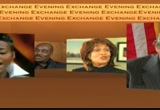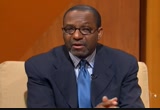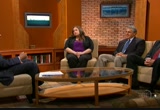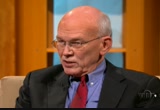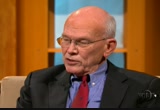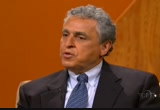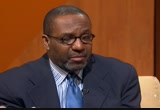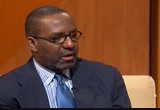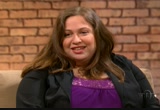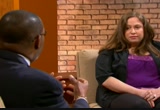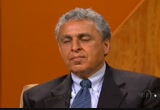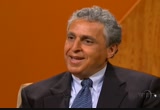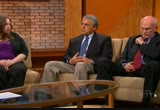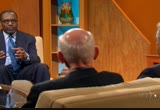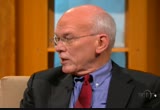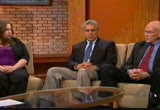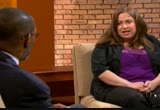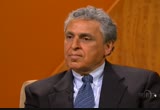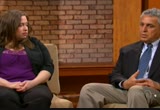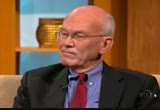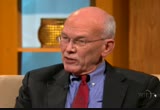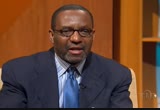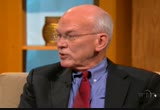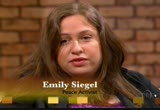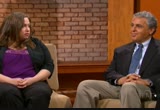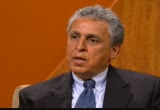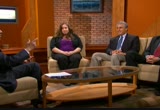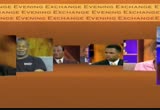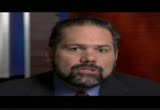tv Religion Ethics Newsweekly WHUT September 26, 2010 7:00pm-7:30pm EDT
7:00 pm
>> hi, i'm kojo nnamdi. the middle east is home to three religions, judaism, christianity, and islam that all celebrate peace and understanding. but when we hear the phrase "middle east," we often think of hostility and violence. at the heart of the problem is the israel-palestinian conflict, essentially a dispute over land, land palestinians believe jews have unrightfully taken, land that many jews feel is their god-given homeland. many leaders of many nations have tried to broker peace to no avail. some believe that continued international pressure is the key to success. others believe that true peace can only be achieved by incorporating grassroots efforts. let's find out what our guests
7:01 pm
think. meet ghassan g.j. tarazi is executive director of the united palestinian appeal, an organization aiding palestinians in need. last year, g.j, whose father is palestinian, led a grassroots leadership training workshop in ramallah. welcome. >> thank you. >> emily siegel is a peace activist and former delegate for interfaith peace builders, an organization that brings people from diverse backgrounds together for trips to the israeli/palestinian are to shed light on grassroots peace efforts in that region. welcome. >> thank you. >> and ambassador phil wilcox, president of the foundation for middle east peace, which works to bring peace to the area through education and advocacy. during his 31 years in the u.s. foreign service, he served as ambassador at large for counter terrorism in the state department and as chief of mission in jerusalem. >> let me start with you.
7:02 pm
given the failure of diplomatic efforts to achieve peace in the middle east, why the continued failure of diplomatic efforts, and what can grassroots efforts to to stimulate the peace process? >> the failure of diplomatic efforts is due to the lack of commitment, sustained commitment to help these two struggling societies out of a terrible mess. the united states, i think can be faulted for its view that it's really up to the parties themselves to solve this. i think it's clear, now, that they cannot do this without strong intervention led by the united states, which has played such an active role. even that will not be enough to make lasting peace, as you suggest. there has to be a commitment to
7:03 pm
peace from the israeli people and palestinian people. at the moment, while they support and want peace, they don't believe it's possible. their support for official peace diplomacy is critical to succeed. >> if they are to support official peace diplomacy, i get the impression that their enthusiasm for that has to start at the grassroots level. to what extent do you see that playing a role in the process? >> i think it's playing a greater role now. i hope it is, because both the palestinian leadership and the israeli leadership have proved themselves quite incapable of making the necessary massive changes. they will do so, however, if there is a strong impulse from their people.
7:04 pm
it's important to that, the grassroots effort, to mobilize stronger support to restore hope among israelis and palestinians that peace is possible to move their governments to do the right thing. that has to be accompanied by a dedicated, sustained official effort. >> you were born in lebanon, raised in brooklyn. why do you have a horse in this race, so to speak, how did you get involved? >> that's a very good question. those are two foreign countries. >> yes. >> i think my father's roots go back to gaza, where the entire family comes from. the horse that i have in the race is justice. i want to see the israelis and palestinians living as good
7:05 pm
neighbors, where both people fluorish. i think that's probably at the heart of my efforts to work on a human level, on a grassroots level to bring about the needed justice. of course, peace is a product of justice. >> the two aspects of your background that interest me. first, your father can place your roots to the 14t 14th century. >> the family takes great pride in knowing the members of the family, so we have members of our family all around the world, and we have an archive as to who lives in chicago, who has a family tree that he sends out every year to every member that's on his pushout list, we're very proud of that. >> it's fairly common, isn't it for palestinians to be able to trace their families back through century, something that
7:06 pm
we in america are completely unfamiliar with. >> yes. >> you are from a christian family, and the stereotype usually associated with being palestinian or palestinian heritage is that you have to be a muslim to be interested in this, but you are christian. >> yes, and the funny thing is when people find out that i'm an american and a christian, they ask when did you convert. the story, the funny story goes is that my great great great grandmother babysat for jesus when mary and joseph were out of town. that's how early my family got involved with christianty, and we're very proud that have, too, even though christianty is a minority religion, especially in gaza, where my family's from. the church where my ancestors were born is still there, and is
7:07 pm
a functioning church. >> you are jewish and have decided that grassroots efforts for peace are probably the major sometime land towards peace in the middle east. how did you get involved? >> growing up in america in a jewish family, i learned a lot about israel, how important it is to our ancestors. i went there when i was 16, so all the historical sites and really felt a connection. i decided to study bit, and learned about the israeli-palestinian conflict, and i decided that i wanted to go there and learn there. i went there after university. part of my job was to go into the west bank to interview youth about their own ideas. >> until that time you had not been to the west bank. >> i had not. i spent a lot of time in israel,
7:08 pm
and felt i knew what was happening there. going to the west bank and speaking to the youth really showed me just how much they were suffering from this conflict. it changed the way that i viewed things. since then, i've worked for a number of different organizations that work on raising awareness here in the u.s. a lot of people, especially the jewish comment have not really the correct information about what's happening there, and all of the non-violent peace activism that's happening in the west bank by the palestinians, as well as israelis who are working for peace there. learning and meeting people on the ground really changed the way that i viewed the conflict, and what really needs to happen in order for the people that live there to be able to live in peace. >> give us a typical example of what happens when you take someone out of the united states, somebody who has
7:09 pm
conceivably like you been to israel before, has not been to the west bank, cease the west bank as a place that mainly produces bombers, and you take that person to the west bank, what happens then? >> i think two things happen. first, there is a lot of confusion, because you go there and are initially welcomed to open arms. a lot of. jewish americans think if i go to the west bank, people will be against me. people are happy that you're there, coming to see what they're going through. a lot of people that maybe go there for the first time, they don't know what to think anymore. everything that they've maybe grown up with is turned upside down. >> g.j., how does visiting the west bank break the store yo type, break the general image that we americans have of
7:10 pm
palestinians? what do we see about the every day life, the individuals' daily routine that causes our consciousness to change? >> i think the idea of peaceful resistance and grass roots efforts have been in existence in palestine since the occupation, since 1967. palestinians could not survive the harsh rules of the occupation and the drastic impact of the occupation without some of these grassroots efforts. the limited mobility, the economic situations that they to have live in are very harsh. they have to rely on each other. they to have rely on their family communities, their neighborhoods, their village, in order to just survive. group work and group dynamics of embedded.
7:11 pm
it's almost part of their dna and is really important. that's where the grassroots efforts come from. >> the impression we also get is that each and every single palestinian in the west bank or in gaza is idealogyically driven, politically driven, religiously driven. how did that affect perception when you actually run into people on a daily basis and see that their daily lives are not unlike ours except they to have struggle more to survive? >> the harshness of the environment is real, and people have to deal with it. however, the three trips that we've taken there have shattered those images that we have being blasted over public media in the united states, where the idea of terrorism is there, where the idea that palestinians are
7:12 pm
terrorists. that is the farthest from the truth that i could ever tell you, strongly tell you that. the people, the palestinian that is we've met, the first word that comes to mind is d. >> gnified. they hold relationships very important. they hold strangers as partly of family members. i can't tell you how many times we've been invited to eat at people's homes. you to have come and you have to meet my wife, or you have to meet my children and my grandchildren. it's just an awesome experience to be enveloped by the dignity and love and hospitality of palestinians. they're very much like any neighborhood in the united states, but i think they have a bigger heart sometimes. >> to move from the permanent to
7:13 pm
the political, and g.j. is a good vehicle for me to do that, because he is christian, and one of the things that you have pointed out that is what we are seeing increasingly on both the israeli side and palestinian side are religious extremists coming to the fore. why dining that you say happening? >> it thieves if there is no way out of a conflict. you have a powerful influential israeli settlement movement, which believes that god gave all the holy land to the jewish people. on the other side, you have a strong and growing islamist faction who believes that allah gave all the land to the muslims. these extremists are a minority
7:14 pm
in their respective societies, but they wield excessive power in the israeli political system, and now they're in control of half of palestine. both of them, alas have promoted vicious stereotypes of the other. they are experts in propaganda, demonization, dehumanization of the other side. unfortunately, these stereotypes have been exported to the united states and abroad, and our society, too, has become polearized. at the centered, there are ordinary, decent human beings who would like peace, but no longer believe it's possible. that's why grassroots efforts to try to strengthen a peaceful core in each society, coupled
7:15 pm
with the powerful diplomatic efforts of critical, otherwise these two peoples face a dark future. >> if the religious extremes are who seem to be com nateing the political conversation right now, and the factor that most people are between those two extremes, when you go to that region of the world, you meet those people, we don't hear a great deal over here about those people. we don't hear about the internal dialogue that is taking place in those places. why do you think we don't? >> that's a good question. i wish that we did. i think that a lot of times in public media, we do focus too much on governments, and on extremism. it's not as popular and spicy to see that there are israelis and
7:16 pm
palestinians working together and talking together, working for peace. it's just not as exciting for people to see that as there is to see there is this person on this side and this person on that side fighting each other. that seems to be more popular in the u.s. right now. >> i found that some surprise recently that every single day, thousands of israelis and palestinians friend each other on facebook pages, getting to know each other on that social networking site. we don't hare a great deal of the dialogue taking place within palestinian communities. when i started in this, and the p.l.o. was a dominant organization, that sectorian or that no one religious organization seems to have in large measure been replaced in
7:17 pm
the political dialogue that we hear of by political extremists. if that doesn't characterize the majority of how palestinians feel, tell us about the dialogue that takes place within the palestinian community. >> the idea of survival is at the heart of what they want to do. they want to survive. they want freedom, they want liberty. even their elections were defined by president carter as one of the most open and transparent elections ever. the palestinian core is one of democracy, independence and freedom. the discussions going on now that i'm hearing more and more about is the idea of peaceful, non-violent resistance. the idea is that i want my voice heard. i want my narrative shared by the outside world. europe seems to have had that image of palestinians more ready
7:18 pm
available to the citizens throughout europe. unfortunately in the united states, we don't hear that narrative as ready. americans have to search out what's going on in palestine, and it takes a lot of work, and the internet is really helping that to quite an e on in palest, among them is that we found something we think is going to work, and that's peaceful, non-violent resistance. we want to make our voice heard. >> the other thing that we don't hear a great deal about, is the dialogue that's taking place within israel itself. we tend to believe that the government of the moment speaks for the israeli people. it is my understanding that the dialogue over the middle east that takes place in the united
7:19 pm
states is much more restricted than the dialogue that takes place within israel itself. is that true? >> that is true. there's a much more open, honest discourse within israel. unfortunately, the progressive, peace-minded political community in israel is still in retreat. public opinion polls there show that the majority realize that occupation of the west bank is wrong, that it mortgages israel's future as a jewish democratic state, and they are desperate for peace. similarly, in palestine, you find the same pattern of a peace-minded majority. the grassroots phenomenon is also critical here in the united states where our own government needs to be prompted to carry out its responsibility as a
7:20 pm
peacemaker. i'm encouraged by the growth of no one sectarian jewish and muslim american groups in this country who are promoting peace and realize that this cannot happen if a partisan provide is taken, that both israel and palestine must work together, that we must support them both, and not take sides, as so often we have in the past. >> i'm going to get back to the non-violent grassroots movement in a second, but the dialogue that we have in this country is in a way as follows, vice president biden goes to israel, while there, there is an announcement of new settlements, he gets upset, the obama administration essentially wags a finger at the israeli government, and you see full
7:21 pm
page ads in newspapers here saying the united states should not criticize the israeli government. we don't hear the grassroots voices at all, and when the united states says we are looking for alliances in the arab countries, and in the streets you cannot get alliance in countries in which u.s. soldiers are risking their lives unless israel stops building settlements. they are a threat to our soldiers there, and that puts people up in arms here. how can grassroots people become a part of that dialogue? >> the american public has been fed a rich diet of partisan propaganda, unfortunately. that's changing, and there are progressive jewish groups,
7:22 pm
progressive christian groups, progressive arab american groups who are trying to change the discourse. one of the promising developments is that new jewish lobby called j street, which is committed to a 2-state peace. in the past, the public voice of the jewish community has been dominated by groups who believe that the united states should defer to israeli policy. >> the american jewish committee, congress, the lobbying groups are the groups we hear from. can you tell us a little bit about the grassroots groups operating in the united states, trying to get your voices heard, trying to talk about non-violent solutions? >> i think that there are a number that are coming up. j street is one example. another that is truly working with grassroots communities is
7:23 pm
jewish voice for peace. there are a number of them, progressive jewish alliance, american. jews for a just peace. there are americans speaking out who say it is not positive for our policies to follow israeli policies and that we need to speak out about things we think are wrong. as jewish americans, we're not them the spokes people for israel. we're human beings, and as a human being, i work for justice. a lot of jewish americans here do work for justice. these organizations, while they're still small and gaining more momentum, they are continually growing, and hopefully, they'll start to make bigger impact. >> organizations provide training for non-violence in the west bank and gaza.
7:24 pm
we don't here a great deal here about the non-violent movements in the palestinian territories. tell us about them. >> the non-violent movement, peaceful resistance movement has been going on for a very long time. dr. lafayette, who was a colleague of dr. martin luther king during the civil lights movement in this country has been to palestine and done training for love thigh neighbor. they have trained many individuals throughout the west bank in non-violent training. this past october, we went to ramallah, and one week, we did a leadership training with the graduates of the king and non-violence training. those participants were well-schooled in the principles
7:25 pm
of martin luther king, the six principles that he propounded. they are going into their communities and raising awareness in their communities about what to do. they are looking at the situation from a very peaceful, through a very peaceful lens and perspective. those are very positive things going on. that's only one organization that's doing that. there are others that are also involved in non-violent training. >> so everything that you have said today it would seem that the grassroots non-violent peace and justice movement is growing both in israel in the palestinian territories and here in the united states. one can only hope that it has the effect on the diplomatic process then can push the process forward. i would like to thank you all for joining us.
7:26 pm
7:29 pm
200 Views
IN COLLECTIONS
WHUT (Howard University Television) Television Archive
Television Archive  Television Archive News Search Service
Television Archive News Search Service 
Uploaded by TV Archive on

 Live Music Archive
Live Music Archive Librivox Free Audio
Librivox Free Audio Metropolitan Museum
Metropolitan Museum Cleveland Museum of Art
Cleveland Museum of Art Internet Arcade
Internet Arcade Console Living Room
Console Living Room Books to Borrow
Books to Borrow Open Library
Open Library TV News
TV News Understanding 9/11
Understanding 9/11